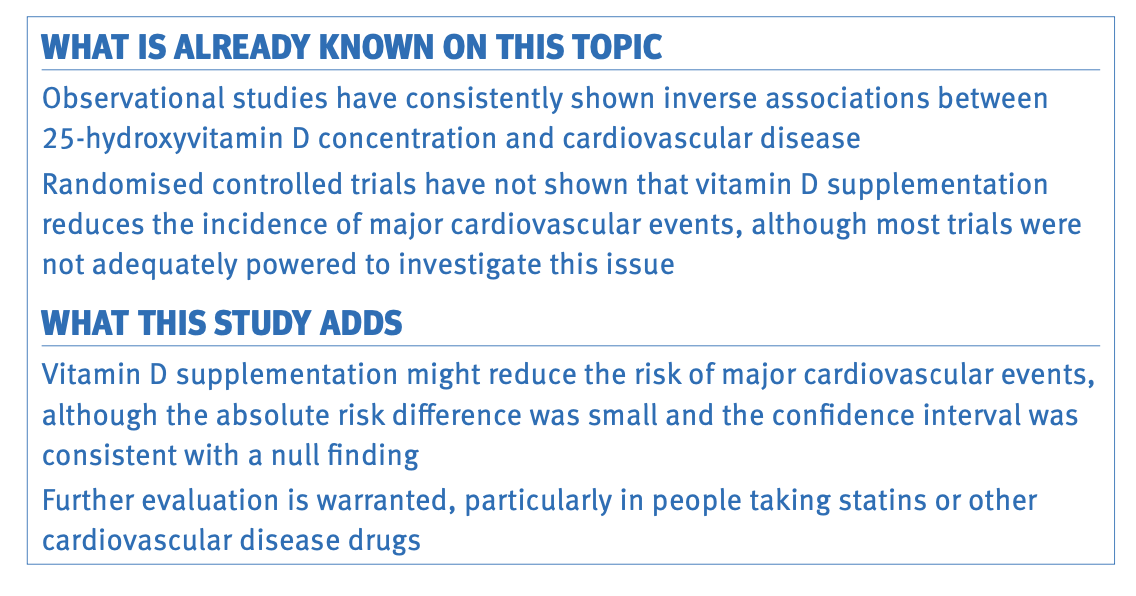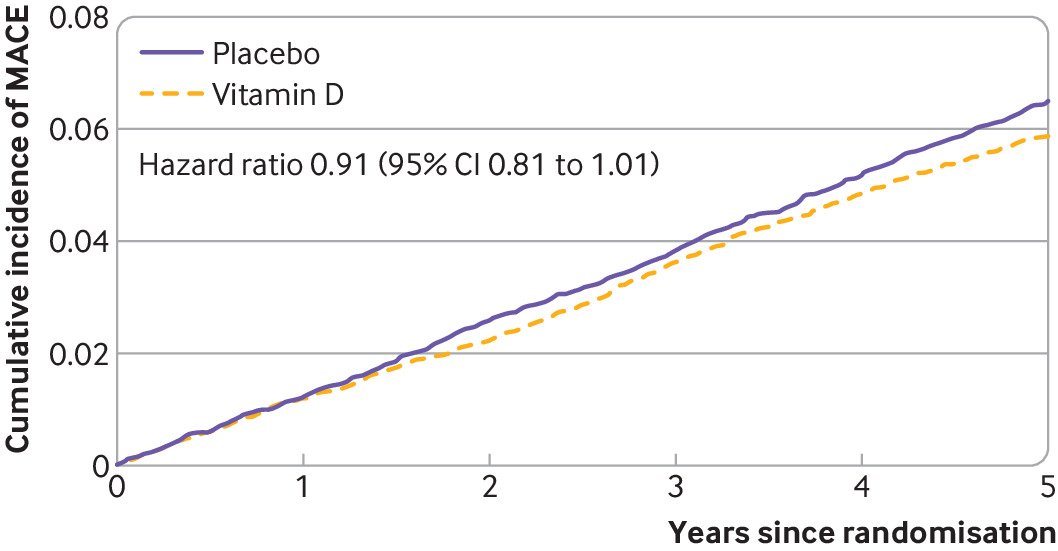Unlocking the Potential of Vitamin D
A Closer Look at the D-Health Trial and its Implications for Cardiovascular Health
In the world of health and nutrition, vitamins often take center stage, offering a host of benefits that range from boosting the immune system to supporting bone health. However, even as they take center stage rarely do vitamins and supplements perform at the level advertised. Taking an active role in our health, increasing our activity, regularly consuming fruits and vegetables, and engaging in positive behavioral actions are going to make a larger impact than any supplement or vitamin so far studied. That is not to say that there isn’t room for supplements, just that lower hanging fruit exist when it comes to improving our health that are less costly and more statistically profound when it comes to improving our health, for instance walking 10,000 steps a day.
Recently a large scale study was done looking at Vitamin D and its impact on heart health. This study, The D-Health Trial has gotten traction in the news. Proponents of vitamin D have taken this study and extrapolated it saying, “You should be taking vitamin D”. While opponents have looked at the research and said, “See we were right all along, Vitamin D supplementation offers very small if any benefit”. Today, we delve into the details of the D-Health Trial, a significant study investigating the effects of Vitamin D supplementation on major cardiovascular events in older adults and provide our interpretation.
The D-Health Trial: A Brief Overview
The D-Health Trial was a comprehensive, well-designed study involving 21,315 participants aged between 60 and 84 years. They were given either a high dose of Vitamin D (60,000 IU/month) or a placebo, and the trial was conducted for up to five years. The goal of the research was to see if Vitamin D supplementation could influence the occurrence of major cardiovascular events such as heart attacks, strokes, and coronary re-vascularisation procedures(such as a stint), which improves blood flow to the heart.
Unraveling the Results
According to the study, the Vitamin D group experienced a slightly lower rate of major cardiovascular events compared to the placebo group, with the effects seemingly more pronounced for those already on cardiovascular medications.
Let's unpack some of the technical terms that will help us better understand the study results:
Hazard ratio: This is a measure of how the event rate, like heart attacks, in the treated group (in this case, those taking Vitamin D) compares to the event rate in the control group (those taking the placebo). A hazard ratio of less than 1 indicates a reduced risk in the treated group. In the D-Health Trial, the hazard ratio was 0.91, suggesting a 9% lower risk for major cardiovascular events in the Vitamin D group.
Absolute risk difference: This term refers to the difference in the rate of events between two groups. In this study, the absolute risk difference was quite small, indicating that although the Vitamin D group had fewer cardiovascular events, the difference in the larger population might be minor.
Number needed to treat (NNT): This is a useful measure that tells us how many people would need to take Vitamin D to prevent one major cardiovascular event. In this case, the NNT was 172, meaning that one major cardiovascular event could be avoided for every 172 individuals taking Vitamin D supplements.
The Biological Role of Vitamin D
Now, you may be wondering why Vitamin D could potentially influence heart health. Well, the answer lies in our biology. Vitamin D receptors are found in our vascular system's cells, the network responsible for circulating our blood. The active form of Vitamin D, calcitriol, has multiple roles; it reduces inflammation, regulates blood pressure, and plays a role in the growth of vascular smooth muscle cells. These functions could contribute to maintaining heart health.
The Larger Picture: Placing the Study in Context
While the findings from the D-Health Trial are promising, it's crucial to understand that this is a single piece of a complex puzzle. Different studies have found varying results, and some have not found any beneficial effect of Vitamin D on heart health at all.
Moreover, the benefits seen in the D-Health Trial were relatively modest. This does not undermine their significance, but rather suggests that Vitamin D is unlikely to be a one-stop solution for heart health. It's just one part of a larger picture that includes factors like diet, exercise, and medication.
A Final Thought
The D-Health Trial presents intriguing evidence about the potential benefits of Vitamin D supplementation for heart health in older adults, especially those already on cardiovascular medications. However, the modest effect size and the complex nature of heart health means that Vitamin D is not a magic bullet solution for cardiovascular disease.
These findings could serve as a stepping stone for further exploration of Vitamin D's role in heart health. More in-depth studies are needed to understand which groups could benefit the most from Vitamin D supplementation, the optimal dosage, and the long-term safety and efficacy of such supplements.
Arguments against supplementing with Vitamin D are mainly based on the coming to the conclusion that certain disease scenarios might see more of a benefit from Vitamin D supplementation, but overall the possible health benefits seen from supplementing with Vitamin D don’t have enough data to support them.
Arguments for supplementing Vitamin D look at the small changes seen in clinical studies and see that as enough of an argument to regularly supplement with Vitamin D and argue that research trials that take time over longer periods of time would show even more of a benefit since many of the protective effects are seen at the end of these 5 year trials.
My Take
The evidence from the D-Health Trial suggests that Vitamin D could potentially offer some cardiovascular benefits, particularly for those already on heart medications. But does this mean it's worth spending money on Vitamin D supplements?
Firstly, let's consider cost. The price of Vitamin D supplements can vary widely depending on the brand, dosage, and form (e.g., tablets, drops, gummies). However, in general, Vitamin D is often viewed as a reasonably priced supplement, especially when compared to many other health-related products on the market.
Secondly, consider the potential health benefits. Aside from the heart health implications, Vitamin D plays a crucial role in several other aspects of overall health, such as supporting bone health, boosting the immune system, and aiding in calcium absorption. Some evidence also suggests it may play a role in mood regulation and disease prevention.
But here's the catch: The body can produce Vitamin D naturally when the skin is exposed to sunlight. So, for many people, spending time outside may be enough to maintain adequate Vitamin D levels, making supplementation unnecessary. However, certain factors such as living in northern latitudes, Hello Ohio!, with less sunlight, having darker skin (which absorbs less sunlight), being elderly, or having certain medical conditions can lead to Vitamin D deficiency.
So, is it worth it to spend money on Vitamin D supplements?
The answer is, it depends. In my mind Vitamin D is a Vitamin that is population specific.
What do I mean by that?
Certain populations will see benefits from supplementing with Vitamin D while others won’t. For instance another study commonly cited when discussing Vitamin D supplementation is the Vital Study. The Vital Study has so far found that Vitamin D supplementation did not decrease the risk of cardiovascular disease, but did appear to decrease the risk of cancer-related deaths. It’s important to note that this study looked at women aged 55 or older and men aged 50 or older who have not previously had a heart attack, stroke or cancer, while the D-Health Trial did include individuals with cardiovascular disease. The researchers of the Vital Study state, “The findings indicate that high-dose vitamin D does not lower the risk of developing cancer or cardiovascular disease in generally healthy men and women.”
The key point being “generally healthy men and women”. With up to 22% of the United States being deficient in Vitamin D and with 2 in 5 adults being obese, which has the potential to alter Vitamin D metabolism, a large group of the population would probably benefit with supplementing with Vitamin D.
Supplements are just that, they exist to supplement, to add on to our diet and what we are already ingesting.
For those with a Vitamin D deficiency or at high risk of deficiency, supplementation can be a cost-effective way to ensure you're getting enough of this essential vitamin, and asking to include a blood test to look at vitamin D at your yearly physical can be helpful to see if their is any indication that your vitamin D levels might be low. For others, particularly those living in sunnier climates or who spend a lot of time outdoors, the need for supplementation may not be as great.
Most importantly, decisions about supplementation should not be made in isolation. I don’t take Vitamin D, but last year in the middle of winter I had my Vitamin D levels checked and I was at a good spot, I regularly get outside in the spring, summer, and fall and regularly engage in activities that are good for my overall heart health. Personally, I don’t see the benefit, but as I age I will probably start supplementing with Vitamin D. If I was in the 60+ age range I might see that 9% lower risk of a cardiovascular event and think, yeah that’s worth it. I did supplement with vitamin D in the beginning of 2020 and through 2021 as well. So even certain scenarios can change whether or not to supplement.
All in all studies have shown that a Vitamin D dose of 2000 IU per day is well tolerated, with few if any side effects. Some individuals will see benefits from supplementing with Vitamin D and others might not see a benefit. Overall, Vitamin D has some pretty strong research showing that it can improve some health metrics and maybe more importantly is well tolerated.
I hope you enjoyed this blog and as always if you have any questions feel free to reach out at drcoffman@optimizecolumbus.com.


